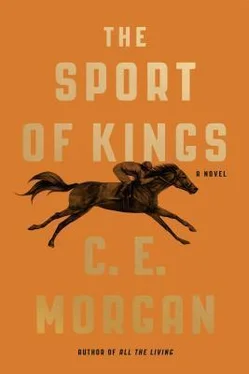She tried it with other grooms, the ones who did not shy away from the unexpected advances of their employer’s underage daughter. The few who accepted seemed doubly aroused by their own illicit desire and fear. These were the ones she had to battle against — they tried to pin her under their demanding, oblivious weight — to climb atop. She figured out quickly to take what she could get, because these men would offer her no pleasure of their own accord. She had no way of knowing that these men were the least worth having, the gates of their inhibition irreparably broken, any native compassion trampled by baser instincts. She didn’t know how to want something better. Nothing mattered beyond the landscape of their hard, alien bodies, which she slid over, around. When she moved on them like that, she discovered that the old way of making herself feel good could be moved inward to some dark place that no one could see and no one had ever named for her. What had been up front and tinny and immediate was now shuddering and agonizingly deep. A birthing in. It was the only thing that was hers alone and it required no thought, and so she became addicted to it. But she had to have a man to do it. She had to have a man to bear down on.
* * *
She dutifully called her mother every other Sunday. When Judith picked up the receiver, before Henrietta could say anything more than “It’s me,” her mother would burst into tears in a manner uncharacteristic but increasingly frequent. Her voice was urgent across the transcontinental air, the trackless air.
Judith: Oh, Henrietta, was I wrong to leave? Tell me your father’s good to you.
Henrietta: I guess.
Judith: You guess? God, he better be. Sometimes I feel I should have fought for custody, but I never could have won against him. Sometimes I …
Henrietta: What?
Judith: I–I don’t know … I don’t know what I think. I guess I … it just seems like men aren’t interested in knowing women. Even the decent ones. Everything is lonely after the excitement. Do you ever get lonely?
Henrietta: Not really.
Oh, Mommy …
Judith: Even though I’m not there?
Henrietta: No. I have Daddy. I guess I miss old Barlow.
Judith: Oh.
Henrietta: Don’t cry, Mother.
Mommy, there’s nothing here at all.
Judith: It’s just … Why do you have to lose everything to understand just a little? I feel so powerless, like nothing ever really changes. You just trade one thing for the next thing, and it ends up being exactly the same thing. Whatever you do, Henrietta, don’t grow up. I swear, they’ve rigged the whole game so women can’t win. I don’t know why they hate us so much.
Henrietta: I don’t think I get to choose anything, Mom.
Judith: I wish you didn’t know that yet.
Henrietta: Can’t you come back?
Judith: Do you know I love you even though I’m all the way over here?
Then why did you leave me in this black breach?
Henrietta: I have to go now.
There are people ahead of us and people behind us, but there’s no one else at all in the breach.
Judith: Oh, honey. They should have named me Regret, just like the goddamn horse.
* * *
She withdrew from the house and began to take long walks to be away from people. She wandered down the road past the Miller property where the curious, bellwethering cows streamed in her direction, following until they could follow no further, stopped short by the perimeter fencing. A coal-eyed, affectless crowd. She wondered what they would say to her if they could open their closed throats, what they would ask.
She discovered that 150 acres had been placed on the market a mile down the road. The property boasted two creeks and a white mansion on a slight rise of land like a white pillar on a plinth, near analog to the Forge land, though this house was even grander, and the land did not depress to a bowl behind the house. The family had left for Florida without waiting for a buyer. In their wake, winter had come. Every morning she hiked up the driveway, huffing frigid air in her exertions until she made her way to a frosted wall at the rear of the mansion where she could spy through the windows the gleaming glassed cabinetry of a white kitchen with its white tiles, where dusty boot marks remained from the movers who had last walked there. She would lean against the outside wall, pull her woolen hat low over her ears, stuff her winter-crimsoned hands into her parka pockets. Then, perfectly still in the freeze, she paid the land mind. The old pastures were deadened by winter — she liked that the season had no scruples, it swept out most of the life to be found there, leaving only spare, hardy, scavenging birds and some winter hares that foraged. The spent grasses waved, and the sky impoverished of clouds sent cold, furious, wasted breezes, far colder than the resting air, to toss the weeds, which were brittle and arthritic. Some days they appeared candied with light snow. She could remain a long time against that frozen wall, not moving, part of the motionless winter statuary that included the stolid trees, the black fencing now white, and the barns, only closing her eyes when the winds came in a flurry. Many hours would be spent in this manner.
But by late April, the “For Sale” sign had been taken down, and one of the abandoned pastures had sprung up a mass of rye as tall as her hips. Still there were no people to be seen. She went wading into the pastures and was soon wet with dew, as wet as a wader in the sea. With her jeans heavy and suckered to her thighs, she could watch morning rise. The fringed rye shook and shimmied, its braided feather tips strung with beads of lit dew glazed white like the hides of those long-gone winter hares. The sky conducted, its windy arms swept low as waves of rye moved in a rustling choral. At this particular hour between first light and the sun’s emergence, the birds didn’t sing, they screamed for morning, as if the wait itself did some kind of violence to them. Then when the sun began to grow a crescent on the horizon, the birds were calm and easy again and began to call for mates now that the first matter, the matter of survival, was settled. The world was renewing itself and it sustained the birds with their small fears and sustained the girl who stood motionless, chilled to the bone and watchful.
Then one morning Henrietta arrived in the early hours to find two white SUVs parked in the driveway of the mansion behind a moving van. And two days later, when she chanced by with her father, she saw that the front paddocks had been mowed and horses installed, horses that turned to watch with dark, extinguished eyes as she passed.
* * *
On a mild winter night in 1990, Hellcat gave birth to a foal. It was not a colt but a gentle, bug-eyed filly that Henry, in his initial disappointment, could not bring himself to name. Henrietta called her Seconds Flat, in honor of her sire, Secretariat, and, hopefully — pray gods and goddesses — her propulsive, thundering, unbeatable speed.
* * *
The life of the racehorse unfolds: first there is the bright newness of the suckling, all dawn-eyed and gawky with legs too long for the body. Seconds Flat was even more awkward than most, her legs just brown crutches she stumbled upon, suggesting a height she would not ultimately deliver. As a weanling, she was still tethered to Hellcat, but haltered and handled now and beginning to explore the limits of her paddock. In the blink of a breeder’s eye, she was turned out in a fresh field with the other motherless foals, skittish and afraid, tracing bereft circles in the grass and gentling to human hands, turning yearling under the watchful eye of her handlers, settling into tender legs and attaining slowly a hint of the conformation of her sire. She was still small with a lady’s legs and a trimmer waist, but possessed his sharp head, the same steely, intelligent eyes, and a haughtiness that made her bite. The grooms knew to be wary of her, and when, as an eighteen-month-old, she was shipped to a trainer’s farm to begin the process of saddling and bridling, they remained circumspect, careful. One man forgot and nearly lost two fingers, but he never forgot again. Her life in training there was a regular one — a pattern of feed and water and stall work, walking in circles, learning to bear the saddle pad and the corset of the surcingle. She snapped and whined when a man lay like a sack across her back for the first time. She fought against the bit as well but ultimately took it, and when the saddle came again, this time with a man atop it, she bucked, emitted a piercing cry that made the other horses dance with anxiety, but then took that too, as they all would, each in their turn. They were broken now and learning to canter on the outdoor track, then jogging singly, sprinting in packs, and the filly began to show the long reach of her inheritance — the balance, self-assurance, stamina accruing like money in the bank.
Читать дальше
Конец ознакомительного отрывка
Купить книгу












